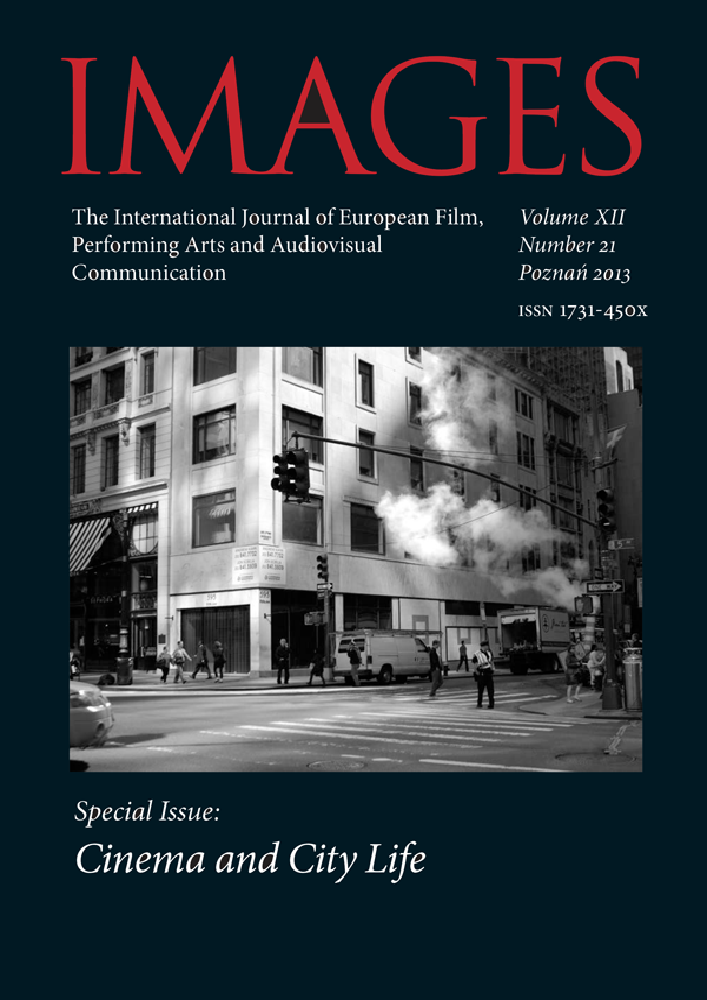Abstract
The article discusses the role of the city in Tales from the Kingdom of Lailonia by the philosopher Leszek Kołakowski, and in the animated film series Fourteen Tales from the Kingdom of Lailonia by Leszek Kołakowski, which is an adaptation of the book. The article is written from the point of view of the originator of the adaptation and the screenwriter of all the films in the series. The author examines the historical and ideological context of L. Kołakowski’s writing the Tales … and analyzes the role of the city understood as the setting of the plot (topos) and the venue for an exchange of ideas (agora) and for the community (polis); he does so on three levels: that of the literary original, the screenplay adaptation, and the film. He also examines the role of the city in those senses for the drama of the individual films, the philosophical and esthetic premises of the role, and – in these contexts – the relations between the selected films and their screenplays.References
L. Kołakowski, 13 bajek z królestwa Lailonii dla dużych i małych, Czytelnik, Warszawa 1963.
K. Mąka, Animacja i filozofia. O adaptacji filmowej 13 bajek z królestwa Lailonii Leszka Kołakowskiego, „Kwartalnik Filmowy” nr 43, 2003, s. 173.
M. Michalski, Dyskurs, apokryf, parabola. Strategie filozofowania we współczesnej prozie, Wydawnictwo UG, Gdańsk 2003.
M. Michalski, Filozof jako pisarz. Kołakowski – Skarga – Tischner, Wydawnictwo słowo/obraz terytoria, Gdańsk 2010.
J. Szacki, Lailonia znajoma, „Nowe Książki” 1963, nr 20, s. 999. Rzeczywiście, w wolnym cytacie z Leszka Kołakowskiego można by napisać, że te „błazeńskie” Bajki „sieją konfuzję leczniczą”.
J. Szacki, Leszek Kołakowski: marksizm, komunizm, w: Leszek Kołakowski – myśliciel i obywatel, red. P. Kosiewski, Fundacja im. Stefana Batorego, Warszawa 2010, s. 17.
E. Obrębowska-Piasecka, Filozofia animowana. Rozmowa z prof. Leszkiem Kołakowskim. Rozmowa z Maciejem Wojtyszką. Rozmowa z Janem Zamojskim, „Gazeta Telewizyjna” [piątkowy dodatek „Gazety Wyborczej”] 2002, 11–17 października, s. 8.
J. Zamojski, Między filozofią a filmem. O „Bajkach z Lailonii...” Leszka Kołakowskiego, w: W stronę kina filozoficznego. Antologia, red. U. Tes, WSFP „Ignatianum”, Wydawnictwo WAM, Kraków 2011, s. 94.
http://tvsfa.com/index.php/kategoria/tvsfa-1980-2001/lailonia/.
M. Łukaszewicz, Bajki różne Leszka Kołakowskiego, „Nowe Książki” 1990, nr 9, s. 11.
Diogenes Laertios, Żywoty i poglądy słynnych filozofów, przeł. I. Krońska, K. Leśniak, W. Olszewski przy współpracy B. Kupisa, PWN, Warszawa 1988, s. 474–475.
Granice miasta. Rozmawiają: Jacek Dominiczak, Piotr Marciniak, Ewa P. Porębska, Marek Wasilewski, Andrzej Wielgosz, „Czas Kultury” 2002, nr 6 (111), s. 9.
L. Kołakowski, Historia, rynek czy demokracja. Sześć gawęd o Londynie na długie deszczowe wieczory, 13 bajek z królestwa Lailonii dla dużych i małych, Czytelnik, Warszawa 1963, s. 54.
License
Copyright
© by Adam Mickiewicz University, Poznań, 2013
OPEN ACCESS
